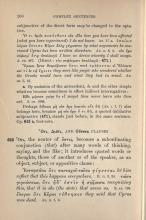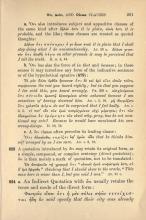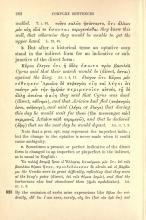622. Ὅτι, the neuter of ὅστις, becomes a subordinating conjunction (that) after many words of thinking, saying, and the like; it introduces quoted words or thoughts, those of another or of the speaker, as an object, subject, or appositive clause:
Ἐννοησάτω ὅτι πανταχοῦ ταῦτα γίγνεται.
Let him reflect that this happens everywhere.
Xen. Hellenica 2.3.24
τοῦτο γιγνώσκων, ὅτι ἥδʼ ἐστὶν ἡ σῴζουσα
recognizing this, that it is she (the state) that saves us
Soph. Antigone 188
ἔλεγον ὅτι Κῦρος τέθνηκεν.
They said that Cyrus was dead.
Xen. Anabasis 2.1.3
a. Ὅτι also introduces subject and appositive clauses of the same kind after δῆλόν ἐστι (it is plainit is probable), and the like; these clauses are treated as quoted thoughts.
Δῆλον ὅτι παύσομαι ὁ γε ᾱ̓́κων ποιῶ.
It is plain that I shall stop doing what I do unintentionally.
Plato Apology 26a
ἄλλως γνωστὸν ὅτι ἀληθῆ λέγω.
On other grounds it may be perceived that I tell the truth.
Xen. Hellenica 2.3.44
b. Ὅτι has also the force of in that and because; in these senses it may introduce any form of the indicative sentence or of the hypothetical optative (§ 479).
Tὰ μὲν ἄλλα ὀρθῶς ἤκουσας· ὅτι δὲ καὶ ἐμὲ οἴει εἰπεῖν τοῦτο, παρήκουσας.
The rest you heard rightly; but in that you suppose I too said this, you heard wrongly.
Plato Protagoras 330e
αἱσχῡνόμενος ὅτι σύνοιδα ἐμαυτῷ ἐψευσμένος αὐτόν
ashamed because I am conscious of having deceived him
Xen. Anabasis 1.3.10
μὴ θαυμάζετε ὅτι χαλεπῶς φέρω.
Do not be surprised that I feel badly.
Xen. Anabasis 1.3.3
τί ποτʼ οὖν τῶν ἐμοὶ πεπρᾱγμένων οὐχὶ μέμνηται; ὅτι τῶν ἀδικημάτων ἂν ἐμέμνητο τῶν αὑτοῦ.
Why, pray, has he not mentioned my acts? Because he would have mentioned his own wrong-doings.
Demosthenes 18.79
c. A ὅτι clause often precedes its leading clause.
Ὅτι ἀδικεῖσθαι νομίζει ὑφʼ ἡμῶν οἶδα.
That he thinks himself wronged by us I am sure.
Xen. Anabasis 1.3.10
623. A quotation introduced by ὅτι may retain its original form, as a simple, compound, or complex sentence (direct quotation); ὅτι is then merely a mark of quotation, not to be translated.
Ὡς ἀποφανῶν τῷ χρησμῷ ὅτι "οὐτοσῑ̀ ἐμοῦ σοφώτερός ἐστι, σὺ δ' ἐμὲ ἔφησθα"
thinking that I should show to the oracle, 'This man here is wiser than I, but you said I was.'
Plato Apology 21b–c
624. a. An Indirect Quotation with ὅτι usually retains the tense and mode of the direct form.
Φανερῶς εἶπεν ὅτι ἡ μὲν πόλις σφῶν τετείχισται ἤδη.
He said openly that their city was already walled.
Thucydides 1.91.4
τοῦτο καλῶς ἠπίσταντο, ὅτι ἄλλως μὲν οὐχ οἶοί τε ἔσονται περιγενέσθαι.
They knew this well, that otherwise they would be unable to get the upper hand.
Lysias 12.45
b. But after a historical tense an optative may stand in the indirect form for an indicative or subjunctive of the direct form.
Κῦρος ἔλεγεν ὅτι ἡ ὁδὸς ἔσοιτο πρὸς βασιλέᾱ.
Cyrus said that their march would be against the king. (direct, ἔσται)
Xen. Anabasis 1.4.11
ἔλεγον ὅτι Κῦρος μὲν τέθνηκεν Ἀριαῖος δὲ πεφευγὼς εἴη καὶ λέγοι ὅτι ταύτην μὲν τὴν ἡμέρᾱν περιμενοῖεν αὐτούς, τῇ δὲ ἄλλῃ ἀπιέναι φαίη.
They said that Cyrus was dead (direct, τέθνηκε), and that Ariaios had fled (πεφευγώς ἐστι, πέφευγε), and said (λέγει or ἔλεγε) that during this day he would wait for them (the messenger said περιμενεῖ, Ariaios said περιμενῶ), and that he declared (ἔφη) that on the next day he would depart.
Xen. Anabasis 2.1.3
Note that a present optative may represent the imperfect indicative; but the change to the optative is never made when it could cause ambiguity.
c. Sometimes a present or perfect indicative of the direct form is changed to an imperfect or pluperfect in the indirect, as is usual in English.
Ἐν πολλῇ ἀπορίᾱͅ ἦσαν οἱ Ἕλληνες, ἐννοούμενοι μὲν ὅτι ἐπὶ ταῖς βασιλέως θύραις ἦσαν, προυδεδώκεσαν δὲ αὐτοὺς καὶ οἱ βάρβαροι.
The Greeks were in great difficulty, reflecting that they were at the kingʼs gates (direct, ἐπὶ ταῖς θύραις ἐσμέν), and that the barbarians also had abandoned them (ἡμᾶς προδεδώκᾱσι).
Xen. Anabasis 3.1.2
625. By the omission of verbs arise expressions like δῆλον ὅτι (evidently), οἶδʼ ὅτι (I am sure, surely), οὐχ ὅτι (for οὐκ ἐρῶ ὅτι, not merely), μὴ ὅτι (for μὴ εἴπω, εἴπῃς, ὑπολάβῃς ὅτι, not to say), not only.
626. Διότι (for διὰ ὅτι, wherefore, because, that) is used like ὅτι, often in the sense of because, sometimes in the sense of that. οὕνεκα (for οὗ ἕνεκα; wherefore, that), is used like ὅτι in poetic style.
Ἐτύγχανε ἐφʼ ἁμάξης πορευόμενος διότι ἐτέτρωτο.
It happened that he was riding in a wagon, because he was wounded.
Xen. Anabasis 2.2.14
Oὗτος δέ μοι φίλος οὕνεκʼ Ἀτρείδᾱς στυγεῖ.
This man is my friend because he hates the Atreidai.
Soph. Philoctetes 585–586
ἴσθι τοῦτο πρῶτον οὕνεκα Ἕλληνές ἐσμεν.
Know this first, that we are Greeks.
Soph. Philoctetes 232




